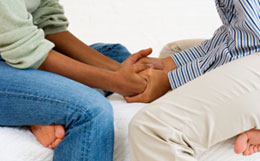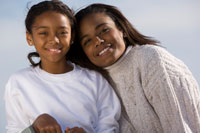Are your kids protected from HPV-related cancers?
 HPV vaccine is a life-saving vaccine that protects against cancer and other diseases caused by Human Papillomavirus (HPV). Get your kids vaccinated at 11 or 12, or as soon as possible if they're already 13 or older.
HPV vaccine is a life-saving vaccine that protects against cancer and other diseases caused by Human Papillomavirus (HPV). Get your kids vaccinated at 11 or 12, or as soon as possible if they're already 13 or older.

A Mother's Story
Jacquelyn, a mother of two and cervical cancer survivor, shares her story. After her son was born, she found out she had cancer and needed a total hysterectomy.
"Every time the doctor calls, I hold my breath until I get the results. Cancer is always in the back of my mind," Jacquelyn says. "I will protect my son and daughter by getting both of them the HPV vaccine series as soon as they turn 11. I tell everyone I know to get their children the HPV vaccine series to protect them from cancer."
Read more of Jacquelyn's story [PDF - 220KB].
Preteens and teens need the HPV vaccine now to prevent HPV-associated cancers later
HPV is short for human papillomavirus. About 20 million people in the United States, most in their teens and early 20s, are infected with HPV. Each year in the United States, about 21,000 women are affected by cancer linked with HPV, and cervical cancer is the most common. Around 12,000 HPV-associated cancers occur in men, and oropharyngeal cancers (back of the throat, including the base of the tongue and tonsils) are the most common. Both men and women can get anal cancer caused by HPV. The HPV infections that cause most of these cancers could be prevented with vaccination.
HPV vaccines are given in a series of 3 shots over a six-month period. For the best protection, it is very important for your child to get all 3 shots. The HPV vaccine has a very good safety record. More than 46 million doses have been distributed, and vaccine safety studies continue to show that HPV vaccines are safe.
Who should get HPV vaccine?
If your son or daughter is 11 or 12 years of age, the American Academy of Pediatrics, the American Academy of Family Physicians, and the Society for Adolescent Health and Medicine recommend you vaccinate now to protect your child against HPV-associated cancer.
If your son or daughter is older than 11 or 12 and has not started these shots, it's not too late to schedule an appointment to begin the series.
How can I learn more about HPV and HPV vaccine?
To learn more about HPV vaccine, visit HPV Vaccine for Preteens and Teens.
Get your questions about HPV vaccine answered by checking out HPV Vaccine - Questions & Answers.
Ask about HPV vaccine during any appointment
 Take advantage of any visit to the doctor—checkups, sick visits, even physicals for sports or college—to ask the doctor about what shots your preteens and teens need.
Take advantage of any visit to the doctor—checkups, sick visits, even physicals for sports or college—to ask the doctor about what shots your preteens and teens need.
Families who need help paying for vaccines should ask their health care provider about Vaccines for Children. The program provides vaccines at no cost to uninsured and underinsured children younger than 19 years. For help in finding a local health care provider who participates in the program, parents can call 800-CDC-INFO (800-232-4636) or go to www.cdc.gov/vaccines.
More Information
Get email updates
To receive email updates about this page, enter your email address:
Contact Us:
- Centers for Disease Control and Prevention
1600 Clifton Rd
Atlanta, GA 30333 - 800-CDC-INFO
(800-232-4636)
TTY: (888) 232-6348 - Contact CDC-INFO



